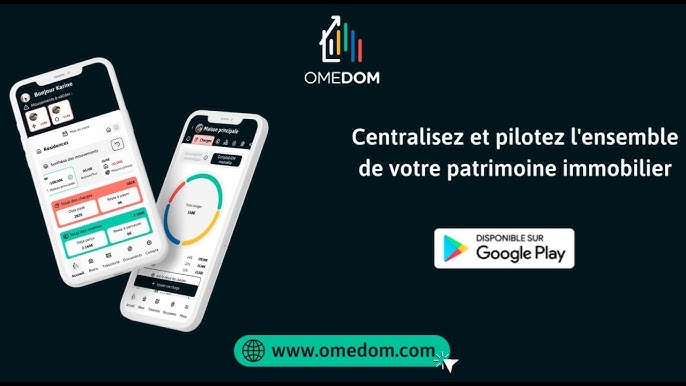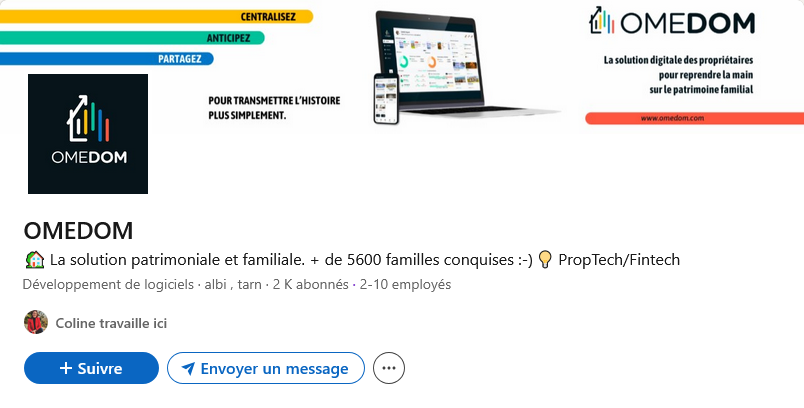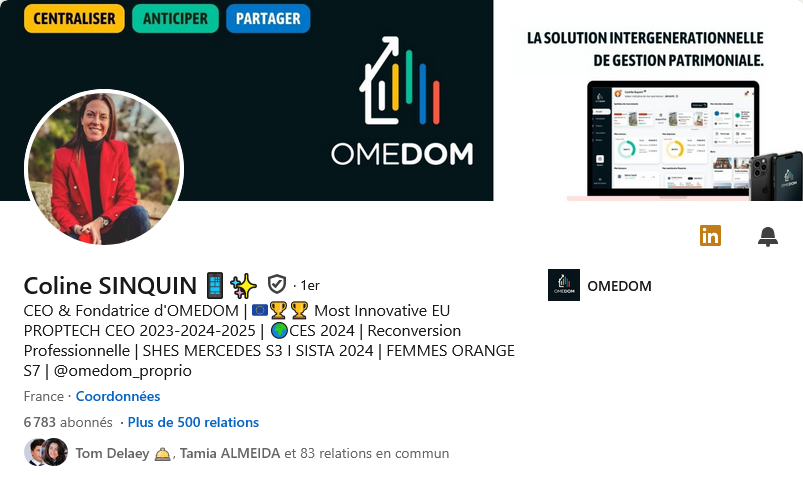Landlord or SCI:
how to effectively manage your rental properties
Discover all the tasks of a landlord, the specificities of a SCI, common difficulties and the keys to efficient and stress-free rental management.
🏡 Investing for retirement, but at what cost?
Many owners acquire one or more properties with a view to building wealth, often to prepare for retirement . But once the properties are rented, rental management can quickly become time-consuming and complex . Between legal obligations, administrative follow-up, tenant management, and maintenance, it is essential to be organized effectively—whether you own the property in your own name or through a property investment company (SCI).
🧩Landlord profiles
In the world of real estate rentals, two main types of landlords stand out: the individual owner and the SCI (Société Civile Immobilière - a type of French real estate company). Each has specific advantages and constraints, depending on the landlord's asset management objectives and the desired level of involvement.
1. The landlord acting in their own name (natural person)
This is the most common profile. The owner buys and rents out a property in their own name. They directly manage all tasks related to the rental: drafting the lease, collecting rent, maintaining the property, and filing tax returns. Taxation depends on the chosen tax regime: standard rental income or the LMNP (Non-Professional Furnished Rental) status, which is more advantageous in some cases. However, the landlord's personal assets are at risk in the event of a dispute or debt related to the rental. This ownership structure is easy to implement but can become burdensome as the rental portfolio grows.
2. The SCI (Société Civile Immobilière)
A French real estate investment company (SCI) is a legal structure that allows multiple partners (family, business partners, investors) to own and manage one or more properties. It offers considerable flexibility in the distribution of shares and facilitates the transfer of assets. Taxation can be chosen between personal income tax (IR) and corporate income tax (IS), depending on the asset management strategy. Management can be collective or entrusted to a manager. However, an SCI requires more rigorous accounting, administrative obligations (general meetings, minutes), and a more structured organization.
👉 The choice between personal name and SCI depends on the number of assets, tax objectives, and the transfer plan.
📊 Comparison: Proper name vs. SCI
| Criteria | Natural person | SCI |
|---|---|---|
| Ease of management | ✅ | ❌ |
| Flexible taxation | ✅ | ✅ (IR) |
| Wealth optimization | ❌ | ✅ |
| Easy transmission | ❌ | ✅ |
| Collective management possible | ❌ | ✅ |
| Accounting | Simple | Complex |
📋 All the tasks of a landlord
Being a landlord involves much more than simply collecting rent. It's an active, structured, and sometimes demanding management process, which revolves around three main phases: before, during, and after the rental period.
🔹 Before renting
It all starts with a fair rent estimate, in line with the local market. The landlord must then carry out the mandatory assessments (energy performance certificate, natural and technological risks assessment, gas, electricity, etc.) to ensure the property meets all requirements. The lease agreement must comply with current legal standards, including essential clauses. Tenant selection is a crucial step: verifying their application, guarantees, and financial stability. Finally, showcasing the property—professional photos, ad copy, and scheduling viewings—plays a key role in its appeal.
🔹 During the rental
Once the tenant has moved in, the landlord must ensure regular follow-up: rent collection, issuing receipts, and annual rent review based on the IRL index. They also manage service charges, oversee the routine maintenance of the property, and respond to tenant requests. From a tax perspective, they must declare income received and maintain meticulous accounting records, especially if using the actual expense method or a property investment company (SCI).
🔹 Upon the tenant's departure
When a tenant gives notice, the landlord arranges a move-out inspection, compares the condition of the property with the move-in inspection, and returns (or withholds) the security deposit depending on any damages found. They may need to carry out repairs or refurbishments before re-letting the property, starting the same process again.
👉 Good organization and, if necessary, the support of professionals can transform this management into a real asset lever.
🏢 Tasks specific to a SCI (French real estate investment company)
The Société Civile Immobilière (SCI) is a popular legal structure for managing real estate assets with multiple owners. It offers flexibility and tax advantages, but also imposes specific responsibilities, both administratively, accounting and legally.
🔹 Administrative management
The SCI (Société Civile Immobilière) must hold general meetings , at least once a year, to approve the accounts and major decisions. Minutes must be taken at each meeting and kept on file and accessible to the partners. Keeping track of the shares is essential, particularly in the event of a sale or transfer. Finally, any change to the structure (change of manager, modification of the company's purpose) requires an update to the articles of association .
🔹 Accounting and taxation
A French real estate investment company (SCI) subject to corporate income tax (IS) must maintain full accounting records, including a balance sheet, profit and loss statement, and supporting schedules. Even for companies subject to personal income tax (IR) , rigorous management is recommended. This involves filing a tax return , distributing profits among the partners according to their shares, and paying corporate income tax if applicable. This complexity often justifies using a chartered accountant.
🔹 Legal obligations
The SCI (Société Civile Immobilière) is bound by transparency rules , particularly with regard to its partners. Clear and regular communication is essential to avoid tensions. In case of disagreements, conflict resolution must be legally structured, with the possibility of recourse to mediation or the courts.
👉 When well managed, a SCI (Société Civile Immobilière) is a powerful tool for increasing and transferring assets. However, it requires rigor, method, and professional guidance.
Common challenges faced by landlords: between management, unforeseen events and property issues
Being a landlord, whether in your own name or through a SCI (real estate investment company), may seem attractive on paper: additional income, asset appreciation, retirement planning… But in reality, rental management comes with many difficulties that must be anticipated to avoid unpleasant surprises.
🔹 Lack of time to manage everything. The first difficulty, and undoubtedly the most widespread, is a lack of time. Between viewings, communicating with tenants, administrative procedures, tax obligations, and coordinating maintenance work, landlords quickly become overwhelmed. Without rigorous organization or the use of professionals, property management can become a source of stress and mistakes.
🔹 Tax and Legal Complexity: Real estate taxation is constantly evolving, with different regimes depending on the type of rental (unfurnished, furnished, LMNP, LMP, SCI subject to personal income tax or corporate income tax, etc.). It is also essential to understand the legal rules governing leases, tenant rights, landlord obligations, and procedures in case of disputes. Misinterpretations can lead to penalties or financial losses.
🔹 Unpaid rent or disputes with tenants Even with rigorous tenant screening, the risk of unpaid rent exists. Recovery procedures are lengthy and costly, and disputes can quickly escalate. Landlords must know how to react with tact, but also firmness, while respecting the legal framework. Rent guarantee insurance can mitigate the risks, but does not eliminate them entirely.
🔹 Unforeseen or poorly coordinated work: Water damage, a boiler breakdown, a roof that needs replacing… Unforeseen work is frequent and often urgent. It's necessary to find reliable tradespeople, obtain quotes, monitor the work, and sometimes manage tenant dissatisfaction. Poor coordination can lead to delays, additional costs, and even disputes.
🔹 Poorly Planned Estate Transfer Finally, many landlords neglect the issue of estate transfer. In the event of death or inheritance, a poorly structured estate can lead to family conflicts, high transfer taxes, or a rushed sale of the property. Creating a real estate investment company (SCI) or planning ahead through a gift-partition allows for better preparation of this step, but requires legal guidance.
👉 In short, being a landlord requires much more than signing a lease and collecting rent. It's a full-fledged activity that demands time, skills, and a strategic vision.
🧭 How to organize yourself effectively as a landlord: methods and tools for stress-free management
Being a landlord is much more than just collecting rent. It's an activity that demands rigor, foresight, and a methodical approach. To avoid oversights, disputes, or financial losses, good organization is essential. Here are the pillars of effective rental management.
📁 Centralize information
The first step is to gather all the data related to your properties: contracts, diagnostics, receipts, tenant contact details, tax deadlines…
Using rental management software allows you to have everything at your fingertips: rent tracking, automatic alerts, archived documents, etc. Solutions like Rentila, Smartloc or Locagestion are very affordable.
Creating a custom dashboard (Excel, Notion, or via the software) helps you visualize at a glance rents received, expenses, upcoming work or tax deadlines.
Archiving all documents in a secure cloud (Google Drive, Dropbox) ensures quick access and reliable backup in case of audit or dispute.
📅 Plan deadlines
Forgetting to file a declaration or a rent review can be costly. It is therefore crucial to plan all important dates.
The tax calendar must include the dates for declaring property income, advance payments, and any necessary adjustments.
Rent revisions (according to the IRL) must be anticipated each year, on the anniversary date of the lease.
General meetings of SCIs , if you manage through a company, must be scheduled and documented, with minutes to support them.
👥 Surround yourself with professionals
Even if you manage it independently, some aspects deserve the expertise of professionals.
A real estate accountant helps you optimize your taxes, avoid mistakes and structure your assets.
A property manager can take care of all or part of the management, especially if you lack time or have several properties.
A lawyer or a notary is invaluable for securing leases, anticipating the transfer, or managing disputes.
⚙️ Automate what can be automated
Automation is a powerful tool for saving time and avoiding oversights.
Rent payments are automatically deducted to ensure regularity without manual reminders.
Sending receipts can be scheduled via software or by automated email.
Payment reminders are essential in case of delay: a simple automated SMS or email can be enough to resolve the situation.
In short, good organization rests on three principles: centralize, anticipate, and delegate intelligently. By combining digital tools and professional support, you transform property management into a smooth and controlled activity. You gain peace of mind, your tenants enjoy greater satisfaction, and your assets increase in value.
Case studies: typical profiles of landlords
Every landlord has their own objectives, constraints, and strategies. Here are three typical profiles illustrating different approaches to rental management, depending on family, financial, or professional circumstances.
👨👩👧👦 Family with two apartments in their own name
This profile is very common: a couple or a family who have invested in two rental properties, often to secure the future or supplement income.
Direct management : Landlords manage the rentals themselves, from tenant selection to routine maintenance. This allows them to maintain control, but requires time and good organization.
Property income : Rents received are declared as property income, with the possibility of opting for the actual regime in order to deduct expenses (works, loan interest, insurance, etc.).
Need for tax support : This profile benefits from being supported by an accountant or tax advisor, particularly to optimize declarations, avoid errors and anticipate regulatory changes.
🧓 Retired with a family-owned real estate company
This owner often set up a SCI (Société Civile Immobilière) to pass on his assets to his children while retaining some control.
Early transfer : The SCI allows for the gradual transfer of shares, via donations, while avoiding excessively high inheritance taxes.
Shared management with children : Decisions are made collectively at general meetings, which promotes family cohesion but requires good communication.
Outsourced accounting : The accounting management of the SCI is often entrusted to a professional, especially if it is subject to corporation tax (IS) or if it owns several properties.
👩💼 Entrepreneur investor
This profile is more technical and performance-oriented. It is a seasoned investor, often an entrepreneur, who owns several properties through one or more SCIs subject to corporate income tax.
Several properties via SCI subject to IS : This arrangement allows you to benefit from advantageous taxation on profits, with depreciation of assets and easy reinvestment.
Tax optimization : The investor works with experts to maximize profitability, arbitrate assets, and structure their operations (holding, dismemberment, etc.).
Complete outsourcing of management : Rental management is entrusted to professionals (agencies, managers), allowing the investor to focus on strategy and development.
🎯 These case studies demonstrate that property management is not a one-size-fits-all activity. It must be tailored to each individual's objectives: security, inheritance planning, profitability, or financial independence. Regardless of the individual's profile, sound structuring and appropriate support can transform real estate into a genuine asset-building tool.
🧭 Investing, yes - but managing intelligently
Investing in rental property means building wealth, preparing for the future, and generating income. But behind this attractive promise lies a demanding reality: the need for daily, technical, and strategic management. Being a landlord isn't something you can just wing—it requires planning.
Whether it's an apartment owned outright or a portfolio structured through a SCI (real estate investment company), success rests on four essential pillars:
A rigorous organization , to leave nothing to chance: tax deadlines, rent revisions, monitoring of works…
Appropriate tools , such as rental management software or personalized dashboards, allow information to be centralized and repetitive tasks to be automated.
A network of competent professionals , capable of providing their expertise where it is crucial: accounting, taxation, real estate law, rental management.
A clear vision for wealth management , which integrates the transfer, tax optimization and long-term appreciation of assets.
At Propriétés De Charme , we believe that every landlord deserves personalized support. Our mission: to transform the challenges of rental management into opportunities for performance and peace of mind. Because a well-managed property appreciates in value—and its owner sleeps soundly.
Investing, yes. But managing intelligently, always.
In a world where real estate remains one of the pillars of French wealth, property management often remains a complex challenge. Multiplication of documents, legal obligations, taxation, relations with tenants or even monitoring market values… all parameters that require time, rigor and constant expertise. It is precisely at this intersection that OMEDOM , by providing a clear and modern response to the expectations of owners.
Since its creation in 2021 in the Tarn region, OMEDOM has set itself the mission of democratizing wealth management by making it simpler, more transparent, and more efficient. Its intuitive platform not only centralizes all data and documents related to real estate, but also allows you to anticipate and better manage the future thanks to powerful tools.
Innovation lies not only in the technology, but also in philosophy : putting the user at the heart of the system, giving them back control of their assets. Where other solutions are limited to an administrative aspect, OMEDOM opens a broader perspective, connecting owners, real estate professionals, notaries, bankers, and insurers within a single ecosystem.
Looking to the future, OMEDOM is establishing itself as a key player in the French and European proptech landscape , ready to support the evolution of uses and respond to the challenges of a society in search of fluidity and trust.
More than an application, OMEDOM is a real estate life partner , designed for demanding owners who want to manage their assets with serenity, security and performance.
A question? Need assistance?
Complete the form below
Digital presence & social networks
Instagram : The official account is @omedom_patrimoine , which betrays a relaxed and familiar tone:
“Join our new Insta page @omedom_patrimoine. Hasta la vista heritage worries, with Omedom, peace of mind is guaranteed!” InstagramYouTube & Linktree : Via their Linktree, we can access two video clips with the founder — an interview at B Smart and another on the #ShesMercedes , which highlights women leaders in tech Linktree .
- Facebook: OMEDOM is the tool for all owners .
Official website ( omedom.com ): It proudly displays its values, awards (11 prizes including 5 international), the trust of more than 5,600 families — with more than 1 billion euros of assets under management — as well as numerous press publications: BFM Business, Presse Citron, La Gazette du Midi, Radio Classique, France Bleu, Forbes, Touléco, La Tribune, Orange …
Key news
A fundraising of 1.2 million euros with the entry into the capital of more than 600 shareholders touleco-tarn.fr adventure .
- https://www.touleco-tarn.fr/Patrimoine-immobilier-La-Tarnaise-Omedom-en-pleine-acceleration,42852
Where to follow OMEDOM and its founder
Instagram : = The tool for all owners: follow, promote, transmit
🌟 +5600 families registered: https://www.instagram.com/omedom_proprio/YouTube via Linktree : some videos with Coline Sinquin; to be enjoyed for her audacity and her voice.
Website / Press : a wealth of articles and interviews to explore, ideal for refining a presentation page or borrowing inspiring content.
You can also follow Coline Sinquin on her favorite network: LinkedIn , accessible via the Linktree Linktree .
- THE OMDEOM APP : https://play.google.com/store/apps/details?id=com.djbuch.omedom&hl=fr

Albi Trade and Companies Register No. 895 124 949
Registered Office: 72 bis, Rue du Commandant Blanché 81000 ALBI
+ 33 (0)6.10.15.62.98
Email: contact@omedom.com
Intra-Community VAT Number: FR87895124949






